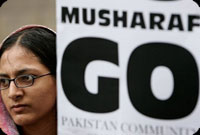|
|
|
-----------------
|
|
|
|
|
|
|
|
|
|
|
|
-----------------
|
|
|
|
|
|
|
|
|
|
Bhutto, Musharraf's tug-of-war
Wed, 14 Nov 2007 15:24:41
By Florence Joseph, Press TV, Tehran |

|
The ongoing tug of war between former Pakistani Premier and opposition leader Benazir Bhutto and President Pervez Musharraf has left one wondering which side will win when the heave is announced.
However, the way things are moving indicates the general's major principle - to cling to power by hook or by crook - may have to be set aside. Unless of course, he defies all international demands and declares another coup! Escalating international pressure has pushed the Commonwealth to serve Musharraf a deadline of ten day's warning to lift emergency rule and hold elections.
The European Union's executive Don McKinnon said that the emergency rule "is a step in the wrong direction and a serious setback to democracy." Musharraf needs to be reminded that the ongoing struggle is a definite test by which the global community is judging Pakistan.
To what extent are the people free and secure? Force, hostility, or coercion with a view to compliance are not only uncivilized and undemocratic measures, such conditions will not get Musharraf out of his current labyrinth. The basis of any democracy, if there is any in Pakistan, is freedom without suppression.
In the latest turn of events , the presence of opposition leader Benazir Bhutto - yet again under house arrest - has lead to an uptight new confrontation over her plans for the mass demonstration she wanted to hold recently against the emergency rule. However, Bhutto, from behind barbed wire shouted through loudspeakers she would try to confront police authorities and lead a march from Lahore to Islamabad. This is her latest protest against the emergency rule declared by Musharraf on November 3.
"This is for her security," the deputy information minister Tariq Azeem said. Bhutto's attempts to lead protests have been banned under the current emergency rule due to threats of suicide bombings.
Musharraf has pushed himself into a tight spot, as the current tense situation and increasing hostility among opposition supporters could anytime ignite into a civil war. The country's political stability and economic situation is in jeopardy. Musharraf's army is treading a thorny path to curb the wave of anger at the emergency rule, while Bhutto, capable and sure of mustering support, has fully capitalized on it.
Although Musharraf announced Sunday that he would hold elections in time, he stopped short of setting a time limit for the emergency rule which has raised brows and major doubts about the credibility of the elections. If Musharraf "has no personal ego or ambitions to guard," and if he "has national interest foremost," the least he should do is to let go of his apprehension and release the arrested lawyers, political opponents and human rights activists, judiciary officials and media professionals, shed his army uniform, stand aside and hold free and fair elections.
This is not asking for much of a country's leader, considering the condition of the Pakistani community, which has been struggling with poverty, and failing institutions under army rule for ages. If we flip through our history books, we find evidence that over the past five decades America has unwaveringly helped Pakistan's army with weapons and money, but the army has done little for its people who reel in poverty. Musharraf has created a position for himself, one so special that the Human Rights Watch refers to his plans as "a cynical sop to the international community meant to deflect attention from his ongoing power grab."
Washington has announced that it will review military aid to Pakistan which has reached $10 billion since the 9/11 attacks. Colossal worldwide pressure, backed by threats of massive cuts in international aid, has raised concerns that the battle against Al Qaeda and Taliban could be affected. Pakistan, a key US ally in the "war on terror," has been urged by US President George Bush to lift the emergency rule and let elections proceed freely and fairly.
The state of emergency has not thrown into doubt only the upcoming elections. Bhutto's recent call for US-backed Musharraf's resignation has crushed Western hopes that a power-sharing deal between the two. The West had been banking on such an alliance to confront increasing extremism.
Now with the government's inconsistency with the public, and the police tasked to crush pro-democracy activists, along with the ongoing mayhem in the streets, extremists are sure to take advantage of the situation. Amidst this, messages from the world public opinion however are loud and clear: at some stage Musharraf must restore the rule of law and seek reconciliation with his political adversaries.
Musharraf needs to bind "the power of democracy and the rule of law" to propel Pakistan to stability, development and security. The international community waits to see who will win this tug of war - very likely Bhutto - who has just issued a call to forge a united front against beleaguered President Pervez Musharraf.
|
|
|
|
|
|
|